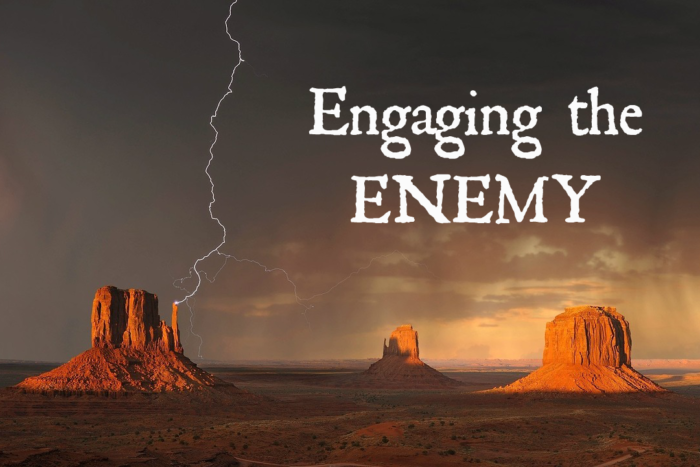
We once walked as the world walks. We were foolish, slaves to our passions and pleasures, and living an ungodly, worldly lifestyle. We were unrighteous, sexually immoral, and idolators. We passed our days in malice and envy and hate. This is how Paul describes those who are not in Christ (see passages below).
But then we were saved through God’s great mercy and loving-kindness! And everything changed! Everything!
You may say “Wait a minute. My neighbor isn’t saved but he is a really nice guy. He doesn’t sound anything like what Paul describes.” But we must remember that even our thought lives and secret sins are known to God. He knows why we do what we do. He knows where our thoughts turn when we are tempted. He knows if our kindness or peace-making are motivated by selfishness.
We are all wicked. There is no exception. No, not one. (Romans 3:11 & 23)
One of the things I have noticed as I have started to study scripture in a more in-depth way is its miraculous cohesiveness and consistency. How often I will read something in one book and then see the same thing reiterated in another. Sometimes by the same human author, but not always. Over and over, we see the same principles repeated.
These past few weeks as I have studied Titus 3, the phrase “But such were some of you” kept coming to mind but I just couldn’t remember where it was from. When I finally did some research, I found it in I Corinthians 6, where Paul lists those who will not inherit eternal life but then goes on to add “But such were some of you.” Titus 3 says something similar where Paul puts it like this–“For we ourselves were once…” And then yesterday in church, our pastor read Ephesians 2 and, lo and behold, here was another passage emphasizing what we were and what we are now. Here we read, “…in which you once walked” .
Each of these passages has a similar theme. Paul first describes unbelievers and then goes on to say how we–you and me (and all who are saved)–once walked the same way. But now we no longer walk in this way. We are changed. We are transformed.
How has it happened?
I Corinthians 6 says it this way– “But you were washed, you were sanctified, you were justified in the name of the Lord Jesus Christ and by the Spirit of our God.”
Titus 3 puts it this way–“But when the goodness and loving kindness of God our Savior appeared, 5 he saved us, not because of works done by us in righteousness, but according to his own mercy, by the washing of regeneration and renewal of the Holy Spirit,“
And Paul writes it in Ephesians 2 like this–“But God, being rich in mercy, because of the great love with which he loved us, 5 even when we were dead in our trespasses, made us alive together with Christ—by grace you have been saved— 6 and raised us up with him and seated us with him in the heavenly places in Christ Jesus,“
Each of these start with the word “but”. We were once lost in sin, but God! God reached out and saved us. It had nothing to do with our own righteousness or good works, but is solely because of God’s rich mercy, great love, grace, loving-kindness, and goodness.
These passages, as we study them together, hold four important lessons for us–
1. First, these passages teach us to truly appreciate our salvation. We so easily forget just how wicked we were before salvation. We start to think we were pretty good and it makes salvation seem like no big deal–particularly if we were saved as children or always lived a fairly moral lifestyle externally. But these passages remind us of what we really were in our core–wicked; selfish; dead in our sins. And this realization then fills our hearts with gratitude and joy that God loved us so much that He provided a way of salvation and eternal life. Oh, how much more we appreciate salvation when we remember the chains of sin that held us so tightly in hopeless despair!
2. Second, these passages teach and emphasize the significant differences between the lives of the unsaved and the saved. These three passages (and many others) consistently remind us that a life saved by Christ is a life lived in direct contrast to a life not saved by Christ. It is incredibly clear that salvation changes us. I understand that reflecting on this can be frightening when we think of some we know who claim to be a Christian while living in sin without conviction or repentance. But this is what the Bible teaches. Life before Christ looks nothing like life after Christ. While it is not our job to judge any individual’s salvation, it is certainly our job to teach this principle of a changed life when we talk to people about the Gospel. Clearly, throughout scripture, we find that true belief yields true change.
3. As we consider the first two lessons, we also learn (or perhaps are reminded) that the lost are not our enemies! As I read these passages, I was filled with real sorrow and tremendous grace for their terrible state. Dead in their sin, slaves to their flesh, and hopeless that anything will change. This was us! We were there. Can you remember that hopelessness? That feeling of being enslaved? Even though I was a child when I was saved, I have started to comprehend as an adult who I was without Christ–who I would be now without Him. This should fill us with such loving-kindness towards the lost. I am so saddened when I see people who call themselves Christians treat the unsaved with arrogance and judgment. This is never the proper response of any believer– in fact, it is exactly opposite of what Christ would do. We must follow God’s example of kindness, grace, and mercy as we share the Gospel and the truth of God’s Word. Perhaps this is one of our highest callings.
4. And, finally, these passages remind us that a saved soul is one prepared to do good works. We do not do good works to be saved, but instead do them because we are saved. This is what we are called to as believers (Matthew 5:16; Ephesians 2:10; Titus 3:8) So exactly what are good works? We have gotten a little confused in this world of politically correct “social justice”. Feeding the poor and digging wells are worthy causes (as long as the Gospel is being shared) but so, too, is visiting your elderly neighbor or babysitting for your friend who is a single parent. Cooking a meal for a hurting family or regular visits with a lonely widow are good works. We can do good works for God by being a godly example to those younger than us, by training and nurturing our children, teaching children about Jesus in Sunday School, praying for a missionary, or by writing notes of gratitude and encouragement. How important it is that we don’t narrow our definition of good works down to what is politically correct in the church in this particular era.
I am sure there are many more lessons we can learn from these passages. These are just four that really struck me as I studied. Studying the Word of God starts to open our eyes to the reality that much of what is being preached in the name of Christ today is really not true Christianity. It is heart-breaking to even write that sentence, but, nonetheless, it is true. When we compare scripture to what is popular today, we can easily see that somewhere–sometime–biblical Christianity and popular evangelical Christianity started to part company. Let us not forget what the Bible teaches us about the saved and the unsaved. This is the only reliable resource for answers. No book, no article, no preacher, no author overrides the Bible. Ever.
Here are the full passages. Notice their similarities and differences–
Titus 3:3-7 For we ourselves were once foolish, disobedient, led astray, slaves to various passions and pleasures, passing our days in malice and envy, hated by others and hating one another. 4 But when the goodness and loving kindness of God our Savior appeared, 5 he saved us, not because of works done by us in righteousness, but according to his own mercy, by the washing of regeneration and renewal of the Holy Spirit, 6 whom he poured out on us richly through Jesus Christ our Savior, 7 so that being justified by his grace we might become heirs according to the hope of eternal life.
I Corinthians 6:9-11 Or do you not know that the unrighteous will not inherit the kingdom of God? Do not be deceived: neither the sexually immoral, nor idolaters, nor adulterers, nor men who practice homosexuality, 10 nor thieves, nor the greedy, nor drunkards, nor revilers, nor swindlers will inherit the kingdom of God. 11 And such were some of you. But you were washed, you were sanctified, you were justified in the name of the Lord Jesus Christ and by the Spirit of our God.
Ephesians 2:1-10 And you were dead in the trespasses and sins 2 in which you once walked, following the course of this world, following the prince of the power of the air, the spirit that is now at work in the sons of disobedience— 3 among whom we all once lived in the passions of our flesh, carrying out the desires of the body and the mind, and were by nature children of wrath, like the rest of mankind. 4 But God, being rich in mercy, because of the great love with which he loved us, 5 even when we were dead in our trespasses, made us alive together with Christ—by grace you have been saved— 6 and raised us up with him and seated us with him in the heavenly places in Christ Jesus, 7 so that in the coming ages he might show the immeasurable riches of his grace in kindness toward us in Christ Jesus. 8 For by grace you have been saved through faith. And this is not your own doing; it is the gift of God, 9 not a result of works, so that no one may boast. 10 For we are his workmanship, created in Christ Jesus for good works, which God prepared beforehand, that we should walk in them.










